Curate, connect, and discover
Media Literacy - Blog Posts

America is an oligarchy led by a fascist president. Eco's Ur-Fascism is a good read. So is Animal Farm.
We are fucked because of a giant cult and the lack of critical thinking and media literacy.
I've been learning not to be suicidal just so I can be taken out by someone else? Great...
At least my suicidal thoughts have the ability of critical thinking.
I hate people.
Does anyone else feel like most people in EVERY FANDOM seem to not be able to separate the quality of a piece of media and their personal opinion.
Like, they say "the show is bad because something I wanted to happen didn't", "the show is bad because I don't like/can't relate to the characters", "the character I like didn't get enough protagonism", "the show is bad because it's woke". The same with movies, book, and videogames.
Bad writting =/= I didn't like it. Why is that so hard to understand?
This is a preview of my first post (that will be posted eventually, I promise)🎹🦖
My Hero Academia is a popular Japanese anime about a super-human society. About 80% of the population has a power of which they call a quirk. Although being able to fly or heal for example seems to be very exciting, these abilities dictate the course of the character's life. This is seen especially in the tragically beautiful and beautifully tragic character, Himiko Toga.

Something I have noticed is that so often in media and in real life, is that we push around this narrative that having a “dark side” or being someone who “you don’t wanna see mad” is a good thing.
If you have a “dark side” you’re dangerous, someone who could hurt others and be cruel, and that makes you strong. That being good in a fight, having the ability to be scary when your angry, those are things that push authority.
I don’t get it.
Why must being benign be seen as a weakness?
Being harmless does not make you fragile.
Violence and strength have been so interwoven to the point people mistake one for the other.
Being violent does not make you strong, and being strong does not mean you have to be violent.
One of the greatest ways to show strength not in a character but in life in general is to choose forgiveness (seriously, like watch ATLA and see how Aang shows great strength by forgiving others instead of lashing out).
Anger is a valid and real emotion that you are allowed to express, but it is not one that should be wielded as a weapon. Anger is a secondary emotion, morphed from pain and sorrow.
Anger is like fire. It’s okay to light a fire, as long as it is safe and contained. You can keep a fire in a fire pit going for as long as you want, just don’t burn a forest.
Do not fear your anger and do not use it to strike fear in others. Being kind does not make you weak, being forgiving does not make you soft.
Generosity, honesty, fragility with your emotions—these can bring you strength. To be open with who you are and how you feel is a tremendous feat.
It takes courage to cry, to ask for help, to forgive.
Know that being loving is not a weakness, understand that forgiveness takes strength.
It’s easy to kill a fly, but it takes effort to capture it and bring it home.
Chat I think we as a writing community lack in diversity.
Now I’m not talking about something like reader inserts with different genders and skin colours, because yes we do lack that but that’s another topic, I’m talking about fic IDEAS.
Things like one shots are getting kind of repetitive, most people focusing on the smut aspect of them when I think fandoms could explore so much more. And this is NOT me saying everyone’s writing looks the same, nor is it criticism on writers because I LOVE what yall do for us readers.
I’m talking about how when I want to consume something from my favourite media most of it is smut and it’s not even actual good smut that shows deep connections and trust between characters it’s just flesh out smut. What happened to creative scenarios and one shot scene guys can we bring back things like
“character x character based reader”
“Character x Reader *insert scenario*”
Where has all our creative literacy gone because half the time it feels like booktok has invaded my tumblr with their ‘steamy🌶️🥵🌶️🥵’ spice.
This isn’t meant to come off at authors btw this is just a little rant I absolutely LOVE fanfics and what the authors do for us readers it’s AMAZING just wish we had less repetition and hardcore smut somwtimes😓🫶
“we need to teach media literacy in schools” guys was i really the only person paying attention in english class bffr
Recently I’ve been going back through BSD to do some analysis and I was thinking about Atsushi as the tiger, and what the tiger symbolizes.
I think the tiger is a good allegory for Atsushi’s views on himself as a person. And hear me out:
At the start of the story, Atsushi fears the tiger, but he also seems to hold some spite towards it due to it being the cause of him getting kicked out of the orphanage.
But then we learn that Atsushi is the tiger, and Atsushi himself feels terrible about it. There is suddenly no separation between himself and the tiger in his mind. They are one and the same, and he is just as responsible for everything as the tiger is. He hates the tiger, he doesn’t trust it, and he doesn’t understand it.
And he is the tiger.
It’s kinda common knowledge that Atsushi hates himself, nor does he trust himself, and that is reflected in the fact that the tiger is shown to be an uncontrollable, bloodthirsty creature. It does nothing good for anyone; just as Atsushi thinks he himself does nothing good or useful for anyone.
I’d also like to mention the fact that during chapter/episode one (1), when Atsushi is revealed as the tiger, Dazai is the one to stop it with his ability, and I think that’s an excellent little nod to how it is through Dazai (and by extension the rest of the ADA) that Atsushi is able to begin to trust himself more, and have more value in himself as a person.
Of course later on, Atsushi does make peace with the tiger, and it’s such a powerful moment because it’s not just Atsushi reconciling with the tiger, it’s Atsushi reconciling with himself as well. And I think it shows his growth as a character just fantastically.
I’m open to hearing the thoughts of others as well of course :]
SAY IT LOUDER FOR THE PEOPLE IN THE BACK 🗣🗣🗣🗣🗣
Some of y'all SERIOUSLY need better awareness and critical thinking, especially when it comes to POC characters; particularly this issue is more prevalent with black characters and women of color, and how you perceive and react to them.
It's shockingly and VERY concerningly common to see this issue occur and to see the lack of self-awareness or flat out willful ignorance to their own internal biases coming out into fandom spaces and their interactions with media. All too often, there is hypercriticality or malice lunged at POC characters, but their white counterparts or even white characters who are absolutely abominable with their views and/or actions get a pass or even end up with sympathizers trying to excuse their actions and views.
Not to mention, it's getting frighteningly more prevalent/common with the rise of right-wing talking points and ideology; at least here in the States.
We need to be aware and alert about this, and always view media and the analysis or reaction to media, INCLUDING OUR -OWN- VIEWS AND ACTIONS, with a critical and analytical eye. We need to question the "why" behind all of it instead of jumping onto and believing in first instinct.
i know of course that fandoms are not immune from cultural and societal biases but it still disappoints me that people in fandom will be blatantly sexist and racist and not even critically think about where exactly those takes are coming from
Yeah maybe the curtains are just blue but maybe the author likes that you see that as symbolism for sadness. Have you ever thought of that? Maybe writers like when you find meanings in their works that they didn't think of. Just because it wasn't intended doesn't mean it can't be true.
Over analyze everything. Find meaning where there was nothing before. We found God in the stars, we can find meaning in the curtains.
i find it so interesting how people act like "critically examining a piece of media" is the opposite of "enjoying that piece of media." rip to you but i actually find it really enjoyable and compelling to dissect and think through the art i engage with
at some point we gotta acknowledge that getting the majority of your news and takes and general opinions from tumblr is not meaningfully different than getting it from tiktok even though on here it's in textual form. understanding the world through the lens of viral videos vs understanding it through breathless unsourced text posts written by dykeastarion69



If you, for some reason, still have a subscription to the Atlantic, cancel it
🔹 Someone else's fiction cannot cause you physical harm.
🔹If someone else's fiction is causing you emotional or psychological harm, or distress, you can put it down and not read/watch it.
🔹Your emotional well-being is not the responsibility of fiction writers.
🔹Someone else's fiction is not about your personal trauma.
🔹When reading or watching fiction, you always have the power. You can always stop. You are never reading fiction without your own consent.
🔹Fiction writers are not responsible for other people's mental health.
🔹The content of a piece of fiction does not reflect on the morality of its author.
🔹Just because someone writes about bad things happening, doesn't mean they want those things to happen.
🔹Don't like? Don't read.
Expectations of an ideal future are shaped by the shortcomings of the present
The way a student of mine tried to argue that he didn’t need to learn how to read outside of the basics because “it’s not necessary anymore. We have AI.” He had a whole (obviously poorly worded, he couldn’t use AI when talking to me) speech.
I’m seriously concerned about my students. They’re 14-15 and a lot of them are bordering on illiterate. Their English teacher plays the audiobooks for their assigned reading to them because there’s no other way to keep the stuff that they do “at grade level.” They simply refuse to read because it’s SO HARD for them (and some just can’t.)



📢📢📢
”Media literacy is dead!” It isn’t. The definition of media literacy is “Media literacy is an expanded conceptualisation of literacy that includes the ability to access and analyse media messages as well as create, reflect and take action, using the power of information and communication to make a difference in the world.” Media literacy isn’t dead, you are just mad it’s being used on something you like. Media literacy is dead to YOU because the only difference you are making in this bitch of an earth is harassing people. We are all just trying to escape in-pending doom but what are you doing? Getting pissed people don’t like a piece of media you enjoy. So congrats, you did nothing. Nobody gives a shit that I don’t like some media, so get a life and stop worrying about what some traumatised queer teenager with four birds likes and hates. I’m airing my grievances about a few shows and some music, I am not trying to change anyone’s opinion, if I respect your opinion then it goes both ways. I have a life. I go to school. I have friends. I have hobbies other than getting mad at kids online.
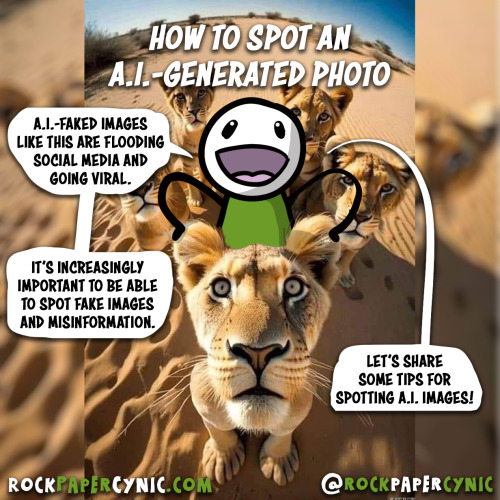
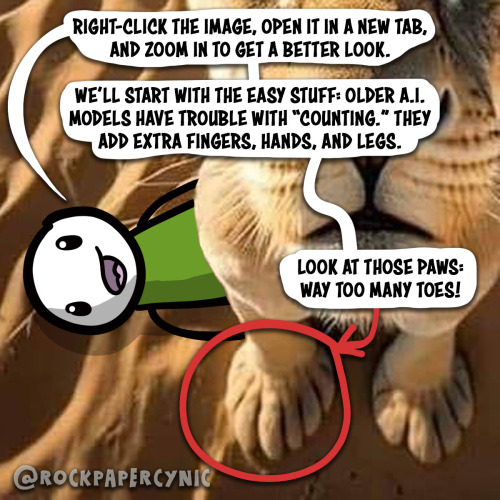
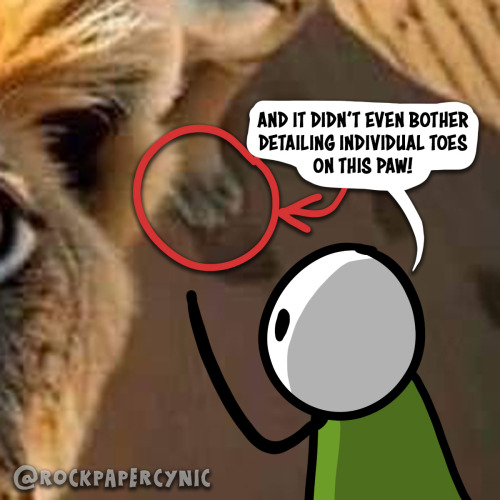
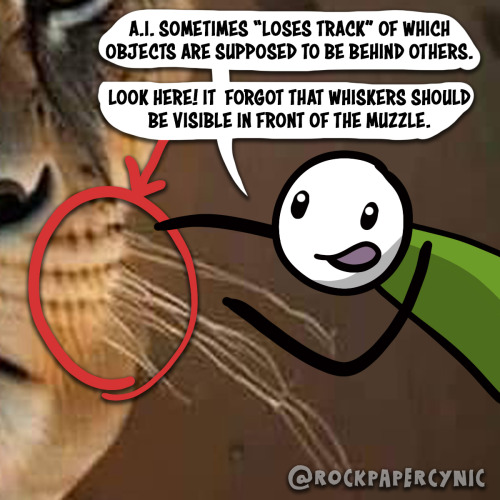
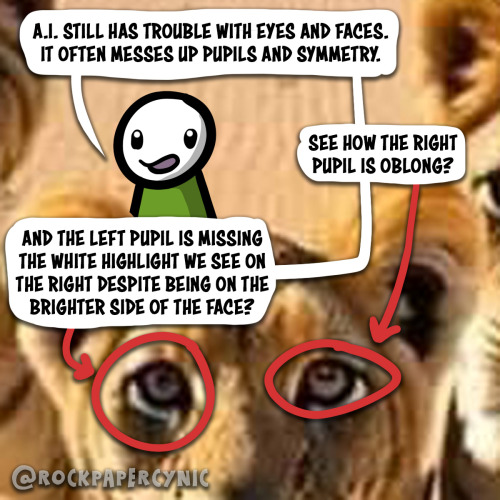
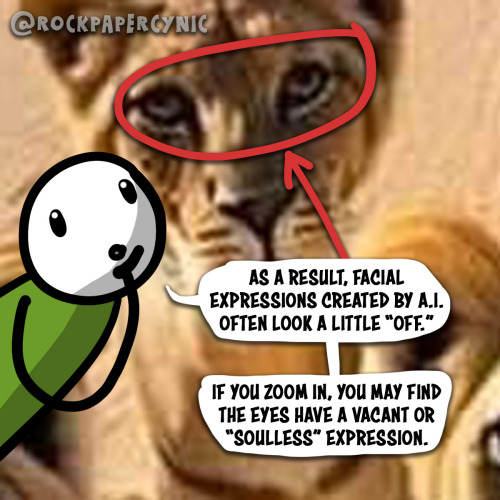
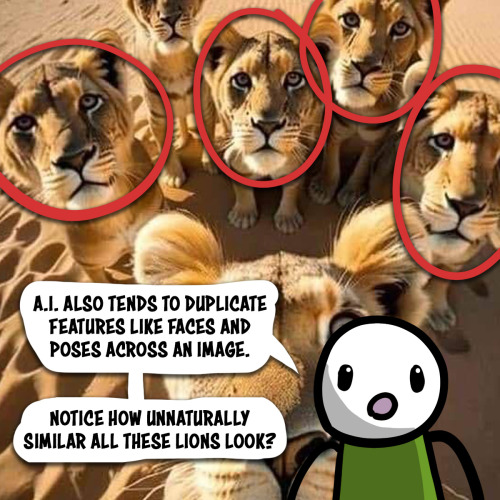
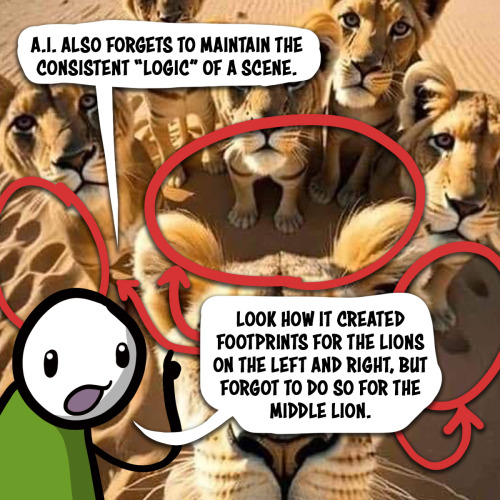
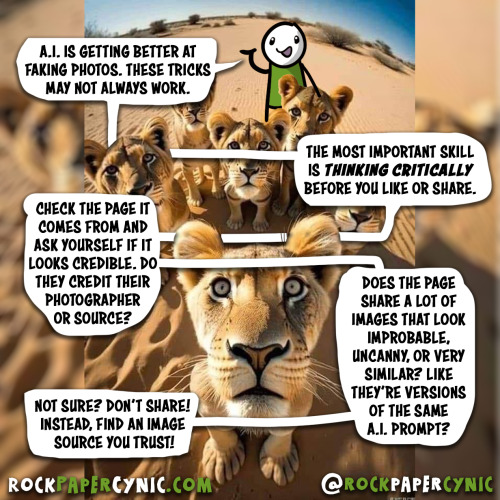
The internet is flooded with AI-generated photos and they're getting harder to spot.
Most of the time AI is used for click-farming, but lately images have been used in fake news stories and product scams.
Most important: THINK CRITICALLY. AI will eventually get too good to make obvious mistakes. Being media literate means checking not just if an image is real, but if the source is trustworthy.
If you're not sure, don't share! You might be spreading misinformation.







A.I. photos are flooding social media and contributing to an Internet where we can't believe what we see. Spotting A.I. 📷s is an important media literacy skill.
None of us have time to research every image we see. We just need people to notice BEFORE THEY LIKE OR SHARE that an image might be fake. If unsure, check it or don't share.
I've started drawing some comics explaining the basic of AI spot-checking and media literacy in the age of disinformation. Follow along here or on my Twitter.








There's an epidemic of AI-made photographs on this platform. Right now, they're mostly used for farming clicks, but as A.I. models get better at faking images, be prepared for a spread of scams, misinformation and propaganda.
Here are some tricks for spotting AI!
I think the Hunger Games series sits in a similar literary position to The Lord of the Rings, as a piece of literature (by a Catholic author) that sparked a whole new subgenre and then gets blamed for flaws that exist in the copycat books and aren’t actually part of the original.
Like, despite what parodies might say, Katniss is nowhere near the stereotypical “unqualified teenager chosen to lead a rebellion for no good reason”. The entire point is that she’s not leading the rebellion. She’s a traumatized teenager who has emotional reactions to the horrors in her society, and is constantly being reined in by more experienced adults who have to tell her, “No, this is not how you fight the government, you are going to get people killed.” She’s not the upstart teenager showing the brainless adults what to do–she’s a teenager being manipulated by smarter and more experienced adults. She has no power in the rebellion except as a useful piece of propaganda, and the entire trilogy is her straining against that role. It’s much more realistic and far more nuanced than anyone who dismisses it as “stereotypical YA dystopian” gives it credit for.
And the misconceptions don’t end there. The Hunger Games has no “stereotypical YA love triangle”–yes, there are two potential love interests, but the romance is so not the point. There’s a war going on! Katniss has more important things to worry about than boys! The romance was never about her choosing between two hot boys–it’s about choosing between two diametrically opposed worldviews. Will she choose anger and war, or compassion and peace? Of course a trilogy filled with the horrors of war ends with her marriage to the peace-loving Peeta. Unlike some of the YA dystopian copycats, the romance here is part of the message, not just something to pacify readers who expect “hot love triangles” in their YA.
The worldbuilding in the Hunger Games trilogy is simplistic and not realistic, but unlike some of her imitators, Collins does this because she has something to say, not because she’s cobbling together a grim and gritty dystopia that’s “similar to the Hunger Games”. The worldbuilding has an allegorical function, kept simple so we can see beyond it to what Collins is really saying–and it’s nothing so comforting as “we need to fight the evil people who are ruining society”. The Capitol’s not just the powerful, greedy bad guys–the Capitol is us, First World America, living in luxury while we ignore the problems of the rest of the world, and thinking of other nations largely in terms of what resources we can get from them. This simplistic world is a sparsely set stage that lets us explore the larger themes about exploitation and war and the horrors people will commit for the sake of their bread and circuses, meant to make us think deeper about what separates a hero from a villain.
There’s a reason these books became a literary phenomenon. There’s a reason that dozens upon dozens of authors attempted to imitate them. But these imitators can’t capture that same genius, largely because they’re trying to imitate the trappings of another book, and failing to capture the larger and more meaningful message underneath. Make a copy of a copy of a copy, and you’ll wind up with something far removed from the original masterpiece. But we shouldn’t make the mistake of blaming those flaws on the original work.
"but the text never explicitly stated it!!!" hey, so that's actually what they tried to teach you in those english classes you barely passed 😁
the :) way :) people :) continue:) to :) misinterpret :) the :) hunger :) games :) to :) this :) day :) makes :) me :) so :) mad :)
Teens on Tiktok are saying that Katniss was the chosen one and President Snow knew she was going to be a threat prior before the reaping…
We gotta bring back media literacy

The only way to stop misinformation and avoid inadvertently spreading radical rhetoric is to stop sharing things you haven't personally looked into.
It sucks, especially with the state of the world right now, but before you reblog something:
Is there a linked source in the post? Click through and read the article, don't reblog it on faith.
Are there verifiable claims in the post but no source? Look them up, see if you can verify what's being said.
Is someone claiming something can't be verified? Try anyway. It's possible that the truth just isn't convenient to the point the person is trying to make.
Does something sound right but you haven't learned much about the topic? You need to learn about the topic first, not from social media but from reputable sources.
Don't have the spoons to fact check? Then I'm really sorry, but don't share it. Don't reblog.
i know it sucks, I know you want to be engaged. But there is rampant misinformation on this site, and it is better to not share anything than to spread lies.
☝️ i agree
Pastoralism in Modern Fiction
Okay. First things first:
Pastoralism refers to a narrative construct popular in the Elizabethan era in which people (usually young people) go into the woods, wander around, and return to their normal life, now substantially changed by their time in The Woods.
One of the most iconic examples of this is A Midsummer Night's Dream. A whole bunch of young people (Hermia, Helena, Demetrius, and Lysander) leave their boring lives and the problems that come with them (Hermia and Lysander want to get married, but Hermia's dad says "nah" and wants her to marry Demetrius instead). They wander around the forest (which happens to be populated with scheming faeries) and eventually return to their home (Athens) with new perspectives on life (Hermia and Lysander can get married, and so can Helena and Demetrius).
Of course, this is drastically oversimplifying the plot, but this same basic formula can also be applied to many other plays of the era, including As You Like It and The Faithful Shepherdess (John Fletcher's absolute trash fire of a play, which you should totally research for a good laugh).
But the thing about pastoralism? It never went away. Like any good, enduring trope, it grew and changed with the public consciousness.
Let's talk about Jumanji: Welcome to the Jungle.
Yes, that's right. The 2017 action film starring Dwayne "The Rock" Johnson, national treasure Jack Black, Karen Gillan (always Amy Pond in my heart), and Kevin Hart (yes, I stalked the IMDB for this).
Obviously, there is some disconnect between the structure of a pastoralist play and what we envision when we think of a pastoral setting. For now, let's separate a pastoral setting from a pastoralist premise, and focus just on the pre-established equation for what makes a pastoral play.
A bunch of young people (Spencer, Martha, Fridge, and Bethany) exist in their boring everyday life with their boring everyday problems (I.E. detention).
They escape this ordinary world into a land of foliage and fantasy. In A Midsummer Night's Dream, the faeries end up influencing the development of the story. In Welcome to the Jungle, the element of fantasy is the video game setting. While pastoralist media does not explicitly require an element of fantasy in order to work (as shown in As You Like It) it's usually needed as a way to lower the characters' inhibitions. By putting them in a situation so far-removed from the ordinary world, they can truly figure out who they are.
By going through this wild, crazy, and dangerous situation, the characters are able to return to their normal lives, significantly changed by what's happened (as shown by their newfound friendship).
If we're going by the previously established definition of pastoralism, then Jumanji: Welcome to the Jungle fits the bill of a pastoral play.
Modern-Day Pastoralism
As mentioned before, there is going to be a bit of disconnect between Elizabethan pastoralism and modern-day pastoralism, but similar elements manifest themselves (purposefully or otherwise) in all sorts of movies, books, and TV shows.
Pastoralist plots are alive and well in modern media if you know where to find them, though most of the plots skew to the "action/adventure" side of things rather than the "romance" side that was popular back in Shakespeare's day.
This probably speaks to how people have begun to view the outdoors. Rather than being something strange, wonderful, and freeing, it is now seen as something that, while still freeing, is also very dangerous. This is expected, as people have increasingly gravitated towards urban life.
However, with the increased romanticization of pastoral aesthetics (I.E. Cottagecore, Gremlincore, etc.) I wouldn't be surprised if we start seeing media reflective of an earlier, more joyful interpretation of pastoralism.
With this in mind, I would like to propose a means of identifying such forms of media.
The main characters must begin their stories with baggage from their ordinary lives.
They somehow end up in a natural environment.
Said natural environment must lower their inhibitions and/or upset the status quo established in their "ordinary world".
They are significantly changed by the time they spent in said natural environment.
One of the shows that immediately comes to mind is Lost, which more or less follows the guidelines.
Each episode features flashbacks (or, as the case may be, flash-forwards or flash-sideways) to the characters' lives before the plane crash (the normal world).
They crash on an island (the natural setting), presenting them with the challenge of surviving not only the natural world, but the strange and supernatural influences on the island.
This disrupts the status quo they adhered to, causing them to grow and change as people.
But that's just a theory... a literature theory! (Nah, it doesn't have as much of a ring to it.)



